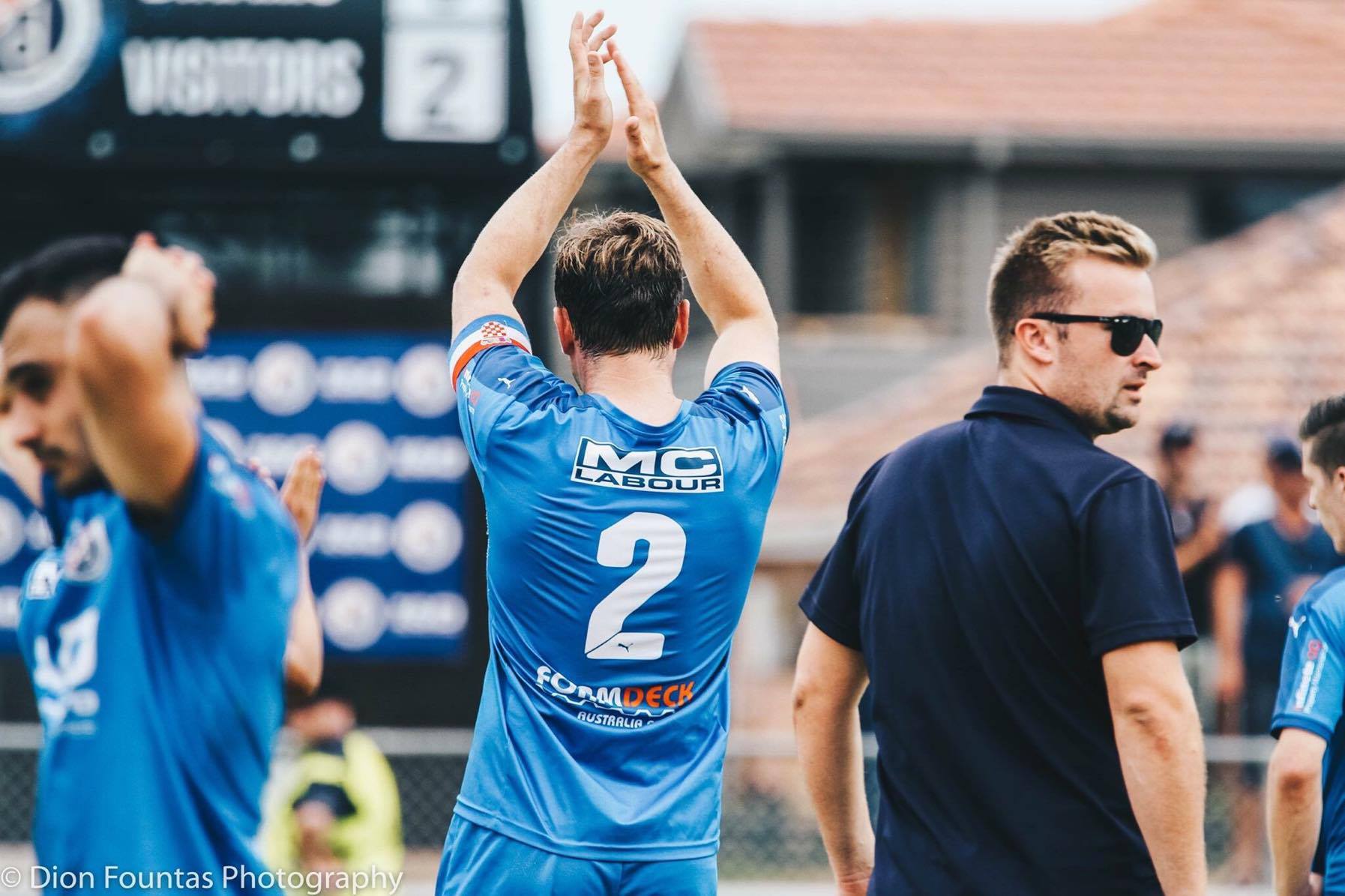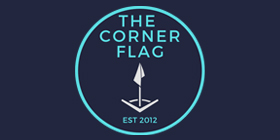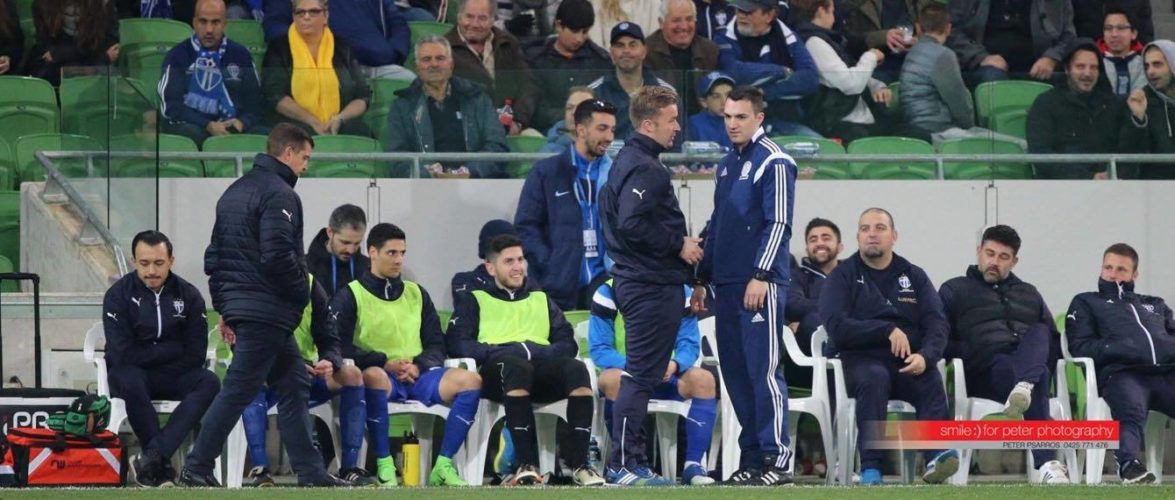Chris Taylor is one of the most successful coaches in Victorian football but lesser known is his assistant Chris Marshall, who has been a pivotal part of his fellow Englishman’s tenure at South Melbourne. TCF spoke with Marshall about his footballing journey and his future ambitions.
***
Tell us a bit about your football beginnings in England and early football memories and idols?
I was around football from an early age. I would be on the side of the pitch from 5-6 years old watching my dad, who had a modest semi-professional career in the north of England and then was a coach at a similar level as he got older. Those were great moments looking back on them now, with the smell of deep heat and the atmosphere in the rooms as kick off approached something which is etched in my memory.
I adored football and had a kind of encyclopaedic knowledge of all of Europe’s leagues, players, coaches etc. even the minor leagues. My idols were the players who could do the things that made the game look easy like Paul Gascoigne and Roberto Baggio but I did have a poster of Bryan Robson on my wall.
How were you as a player and did you come through the ranks of any clubs back home?
As a player I was a very stock-standard and hard-at-it holding central midfield player who, if I’m completely honest, had a far better understanding of the game than an ability to put it into action. In my late teens I plied my trade around the non-league scene but was never going to be good enough to kick on from there and so then went to university. I had more of an interest in the coaching angle than I did in playing and I was interested in coaches more than players as it was the coaches’ autobiographies I seemed to read more than the players’ and watched snippets of video from team talks and so on.
At the age of 21, I was at University in Leeds and continued playing football in the UK’s top university league where I was also the assistant coach for the first team in my final year. The standard in that competition was actually very good and some of the sides, for example Loughborough University, was made up by Nottingham Forest and Leicester City academy players. More recently a young lad was brought into the England C squad from the University of Manchester’s side so it’s good to see that level of footballers’ who are encouraged to get an education continues to flourish.
Can you tell us a bit about your role in England working with seasoned professionals?
I’ve worked with Excelfoot Ltd. Directed by father and son team Willie and Mark McKay for almost 10 years, it essentially is a professional coach, player and football club intermediary company mandated to represent a player or club in the transfer process and then provide guidance on other decisions coaches and footballers are faced with, including wealth management and endorsements. I work mainly in a talent scouting capacity on the football side of the business and it’s a great role for a football person like myself. I have been fortunate to be exposed to an awful lot of high-level football and footballers including accompanying pre-season trips over the years with Marseille, Lyon, West Ham and Newcastle while watching and reporting on players in games all over the world.
The business has a solid history of matching clubs with the right kind of coach or player to meet the football clubs objectives. We have been involved in some really successful transfers over the years, starting with the likes of Nicolas Anelka to Manchester City, Marcel Desailly to Chelsea, Joey Barton to Newcastle and more recently Dimitri Payet and Andre Ayew to West Ham.
We were also involved in some interesting football projects, for example bringing the likes of El Hadj Diouf, Pascal Chimbonda and Habib Beye to Doncaster Rovers in 2012 for little money in an attempt to support the local club where our business and residences were based and in my case a lot of my family were born.
What prompted the move to Australia and ultimately South Melbourne?
Mainly the opportunity to live and work somewhere new and somewhere my partner and son wanted to come and live and experience. I still maintain the ability to travel to work with European football and did so recently in April and last year for the European Championships in France, but I have a normal and, dare I say it, more regular business life outside of football that I’m enjoying in Australia also.
Of course, going back to football, we are like any smart football business, keeping one eye on what is happening in the Asian football markets as there are some lucrative opportunities for players and coaches that could be interesting for some of the individuals we have in our network. I was recruited to South Melbourne FC by Chris Taylor who I had met through a mutual friend when I had just arrived in Australia and discovered we share some contacts back in England.
CT was in what proved to be his final weeks at Dandenong Thunder and shortly after took the helm at South. He asked if I would analyse his new side from the stands initially and offer some input and feedback in preparation for the following season, which I was happy to do and to be involved in the local football scene here in some capacity. It’s a lot different to the level we do business at but I am a genuine lover of football at any level.
On the weekends you will see me down at Mornington watching the senior team after my son’s U7’s have played as long as it doesn’t clash with South’s fixture. For the 2014 season, CT asked if I could get a little more involved and three years later I am just thoroughly enjoy playing a small part in a great club.
I’m not joking when I say as a younger man South Melbourne FC and Heidelberg United were the only teams I had ever heard of from the whole of Australia. South because of its history with Puskas and the hysteria around Manchester United not playing in the FA Cup and instead heading to Brazil to play in the FIFA Club World Cup back in 2000, where they faced South. I knew of Heidelberg United because a bloke called Paul Wilson from Doncaster came over and played there for a season and then ended up returning to England and running the Doncaster Rovers youth academy for many years.

What is it like working alongside Chris Taylor, one of the most decorated coaches in Victorian football?
I think we have a strong working relationship that stems from a very similar upbringing in and around football and both share a huge and almost obsessive passion for the game. CT has a style of management that is familiar to me and one I think is very effective for this level of senior football, where his recent record over the last 5-6 years is simply outstanding.
We have a good understanding and both share a culture that the quality of character and work ethic of a dressing room is almost as important as its football ability. We do not always agree on every decision but as a coaching function we are very tight, and I simply try and offer him solid analysis and always try to offer an alternative angle to a situation or thought process so that we have every base covered in preparation for the next session, match or decision he makes. CT is very methodical in his approach and preparation and we are very big on routine if for no other reason but keeping a team’s mental focus. It’s an environment and a pressure I enjoy working within.
What I have learnt from being around some great managers in the professional ranks, though, is once a decision is made by the gaffer, an assistant should be 100% loyal to the decision and deliver it to the best of their ability. A united coaching staff is paramount in a successful team and it is why a lot of good head coaches like to take their assistants with them wherever they go.
I know Harry Redknapp wouldn’t really want to go anywhere without Kevin Bond, for example, and will take him to Birmingham City now that he’s signed there permanently, but there is a clear line between who is the head coach and who is the assistant and this is very important across all levels of football. I think the NPL actually has some really good coaching partnerships at the moment. Two examples which spring to mind are John Anastasiadis and John Gabrielson at Bentleigh and George Katsakis and Jeff Olver at Heidelberg. Thus it is hardly surprising for me that these sides will continue to have strong results based on their coaching consistency.
How have you assessed South Melbourne’s season to date?
We were disappointed not to have been on top of the NPL ladder at the halfway stage because that was our plan. It was an obvious goal given we expect to win every game but realistically I think after a difficult start we are right back in the hunt now and through to the FFA Cup round of 32, which was a major objective this season following disappointment at the final hurdle last year.
We have recruited some very good younger players this year with the likes of Jesse Daley, Luke Pavlou and Ajdin Fetahagic coming down from Queensland to join the squad. In saying that we lost some quality senior players like Stephen Hatzikostas, Iqi Jawadi and Matt Theodore who moved on and we probably needed a little period to bed the new boys in and get them used to our system.
With that and some unfortunate disciplinary suspensions to certain players out of the way now, I think we are in a strong position to fight for silverware on all fronts. Obviously being involved in a game like that comeback against Dandenong City in the FFA Cup will live long in the memory for me and everyone at the club.
What are your future aspirations in the football world?
In the short term I’d like to win some more trophies with South Melbourne this season. In the mid-term future I’d like to see further opportunities open as a result of expansion in some form to the national competition. If this were to happen in addition to the restructuring of the salary cap system, I believe that football in Australia can flourish again as the current model isn’t helping us compete against the rising Asian markets.
If the aforementioned initiatives are put into practice, it would be easier for me to get involved with Excelfoot Ltd and bring some players to these shores whilst they are still in their prime with a view to further raise the bar. It would be my utopia if that were to occur with South Melbourne involved once again in the national competition.

